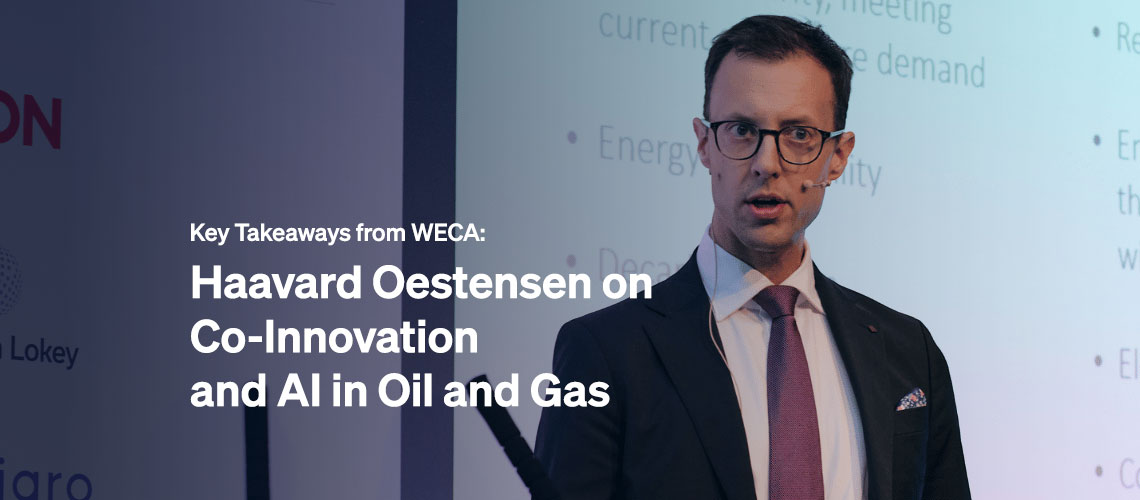November 27, 2024
Co-Innovation, Digital Transformation, and AI in Oil and Gas: Insights from WECA

Haavard Ostensen, EVP & Chief Commercial Officer, Kongsberg Digital
Industry-level collaboration
I recently spent two inspiring days at the Energy Capital Assembly (WECA) in London, where I engaged with energy leaders to discuss the crucial roles of digital technologies, AI, and co-innovation in the oil and gas industry.
During the keynote on digital transformation, we explored how to scale digital initiatives for better performance, using the Energy Transition Campus Amsterdam as a prime example of successful collaboration across industry boundaries. Later, our tech panel discussion highlighted the importance of digital decision-making in enhancing operational efficiency.
One of the standout moments from WECA was the Co-Innovation Partnership workshop, organised by Kongsberg Digital and The Energy Council. Together, we tackled the toughest challenges within the energy sector and featured insights from industry giants like S&P Global, Yara International, Climate Investments, and Microsoft. I'm truly optimistic about the future of our industry as we harness these collaborative efforts.
Reflecting on the discussions, it is evident that the current landscape—characterised by rising costs, geopolitical uncertainties, and a firm commitment to decarbonisation—demands urgent industry-wide innovation. Two major trends are emerging:
- Collaborative Ecosystems: Companies are increasingly forming innovation networks to drive progress. Initiatives like the Energy Transition Campus illustrate how diverse organisations can unite across technological and operational lines to foster effective innovation. Co-venturing and commercial innovation show that projects like Northern Lights can succeed through collaboration.
- Strategic use of Digital and AI: As generative AI and other technologies evolve, revising our operating models becomes essential. Industry leaders are adopting a non-linear approach to tackle unprecedented complexity, focusing on the integration of digital tools to improve key performance metrics.
Where leaders stand today
We recently completed an executive survey in partnership with The Energy Council, which highlighted the critical role that collaboration plays in driving success.
Notably, 69% of industry leaders believe that partnerships with tech suppliers are vital to accelerating the energy transition. Companies emphasising co-innovation report an increase in return on assets of up to 4% compared to peers who rely solely on data, underscoring the value of aligning strategic goals with practical execution.
Read the full report from our survey with The Energy Council here →
Transforming Work with Digital Twins
Through our work with the energy industry, we have observed several key strategies where digital twins are fundamentally changing operational practices and decision-making processes:
- Digital Foundation for Design: By utilising digital tools from the outset of projects, organisations can reduce reliance on physical sensors and improve quality assurance through simulations. This approach not only leads to cost savings but also shortens project timelines and fosters a more efficient organisational structure.
- Digital Performance Model: Setting clear asset performance goals and aligning processes accordingly plays a crucial role in decision-making. This strategy promotes better data access and collaboration, resulting in streamlined operations and enhanced overall performance.
Key Takeaways from WECA
- Engage in co-innovation by collaborating with technology suppliers and industry peers, driving standardisation and interoperability for industry-level benefits.
- Prioritise quality decision-making and end-to-end execution; company performance correlates directly with decision quality.
- Implement a "digital by design" strategy early in projects, questioning sensor use and establishing structured quality assurance and acceptance requirements.
- Develop a digital performance model that reorganises operations to leverage the benefits of digital tools and AI, enabling leaner and faster organisational processes.
In conclusion, the Energy Transition Campus in Amsterdam stands as a testament to the power of collaboration, showcasing how diverse organisations can collaborate to drive meaningful innovation. As we move forward, fostering these cooperative ecosystems will be key to achieving a sustainable energy future.
The future is digital, and the potential for innovation is boundless. Let’s keep pushing the envelope in energy.
Author

Haavard Oestensen
EVP & Chief Commercial Officer, Kongsberg Digital As EVP and Chief Commercial Officer at Kongsberg Digital, Haavard Oestensen is responsible for global sales, marketing, partnerships and alliances. This includes definition and execution of the company's global commercial and go-to-market strategy. With more than 18 years of experience in the integrated gas, LNG and upstream industry, Haavard applies his industry, software and management consulting experience at the core of the energy industry to help companies activate a digital operating model and achieve a higher order of performance across their business operations.
Related news

4 September 2025
From Historians to Knowledge Graphs: Turning Tags into Decisions

3 September 2025
Why Contextualisation Is the Hard Problem in Industrial Data (and How to Solve It)

28 August 2025
With SiteCom Go, your well data fits in your pocket

27 August 2025
LNG at a Crossroads: How Digital Twins Are Redefining the Future of Gas